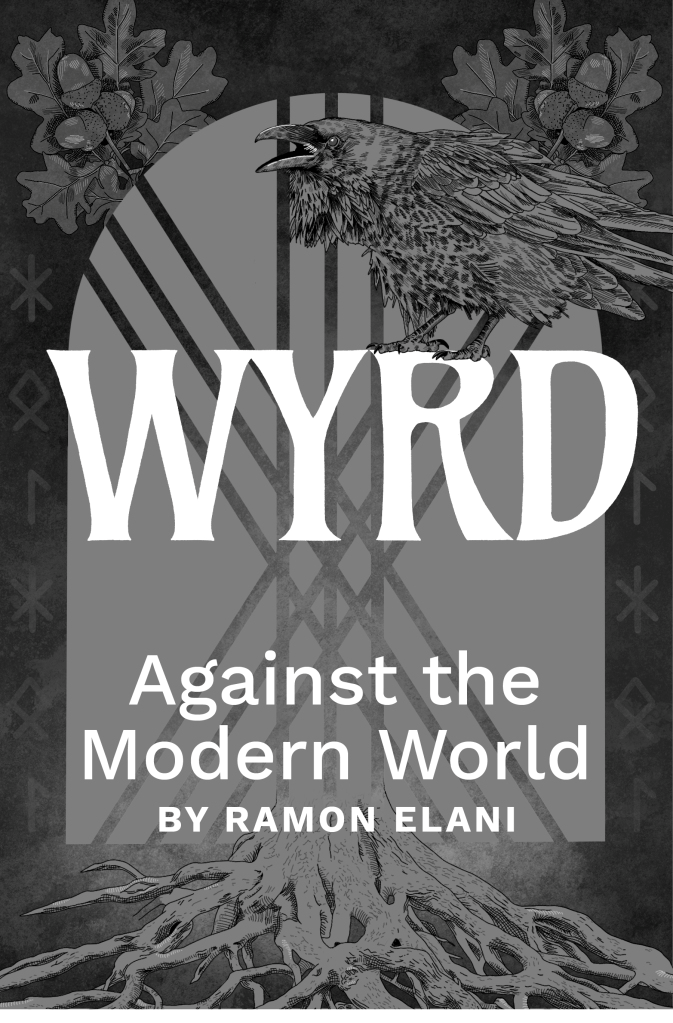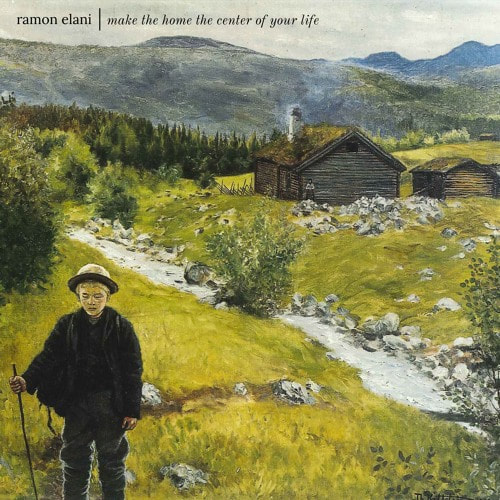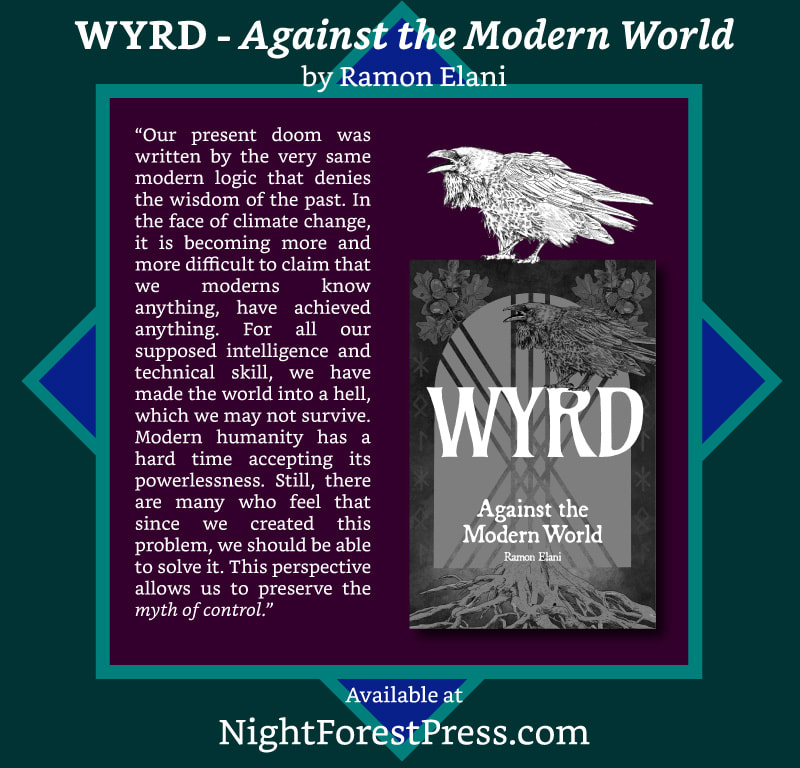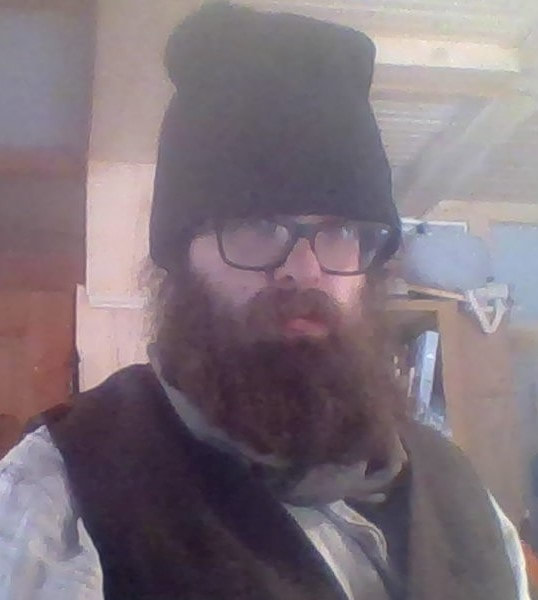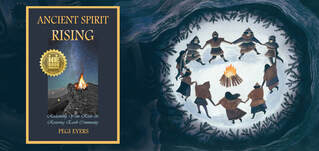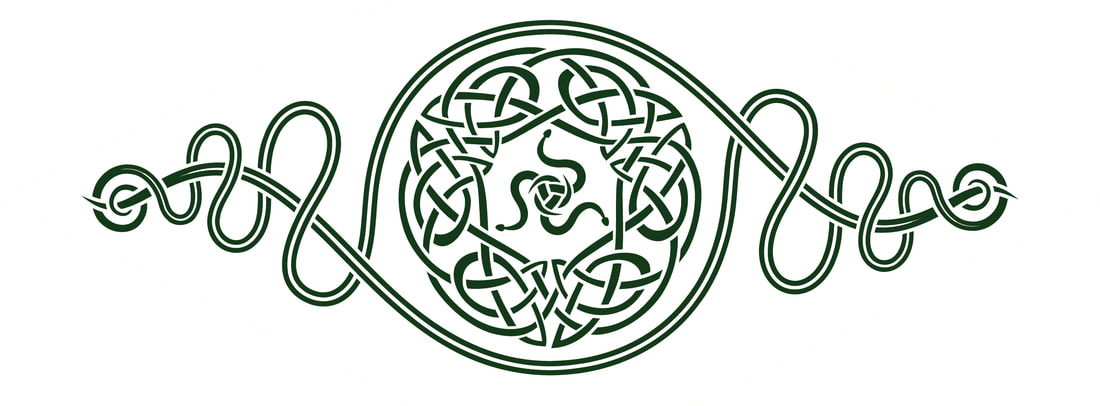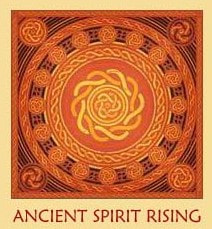Review by PEGI EYERS
Once in a lifetime, a book may come along that changes your worldview forever, and Wyrd Against the Modern World is one of those offerings. You will find yourself deeply resonating with the truths as articulated by Ramon Elani in this phenomental work! His description of our current era of climate change is brilliant, and his “deep dive” into root causes, ancient forces, the Gods, and the concept of Wyrd will leave an indelible mark on your soul. Published by Shaun Woods and the folks at Night Forest Press, pages of profound wisdom reveal primal dreaming - a time when our collective ancestors deferred to the true powers of the Gods, wild nature and the land - and how our world has been destroyed by the structures of humancentric dominance and modernity.
“As our world dies, we re-enter the mythic age of gods. For five hundred years we have been told, and largely believed, that we are the sole agent of the cosmos. The hidden folk we once counted among our kindred, the architects of modernity declared were superstitious illusions. Elemental powers, earth, water, air and oak became reduced to mere material. This moment of collapse proves to us that we were never in control, and that we were never alone. In the burning sun, the savage storm, and the rising sea, are the grim faces and voices of the gods and spirits that modernity so proudly put aside. It is said that at the end of the world, the dead will rise.”
Restoring the worldview of our ancestors through paganism, reconstructionism and cultural revival is a thriving “future-primitive” movement right now, but Elani adds a powerful and much-needed voice to the conversation. He reminds us that we cannot romanticize the past, or gloss over dark forces such as catastrophe, bloodstain, dissolution, death or decay, as these are the chthonic forces that shape our world. He also reminds us that while encased in a bubble of modernity, nature has always been waiting, and the most ancient beings are on the move again. Underneath all the layers of our “god-killing, life denying” techno-industrial world, the same sacred elements and patterns of the land speak to us, as they have for thousands of years. Right now, we are at a “moment of descent” to the Underworld, a “baptism by climate change,” and a journey we can only hope to survive, with the aid of the primordial powers. As Elani points out, many of us know deep-down that the world is ending, and that collapse cannot be held back - or fixed - by human-created solutions.
Which brings us to the elusive concept of Wyrd, and Elani’s brilliant expansions on the Norse, Heathen and Anglo Saxon definitions of “fate,” destiny” “becoming,” “unfolding,” and “always in process.” Drawing on the natural law of reciprocity, he creates an entirely new concept of Wyrd as a closed loop of gifts and exchanges in Earth Community, that constantly regenerate the whole. Wyrd is co-creation, the interconnected nature of the world, a weaving of threads that link all beings in complex and mysterious ways. Humans can adapt to the patterns of Wyrd, and “read the signs” through an animist perception, and yet are incapable of perceiving the totality. Including quotes from other great thinkers such as Brian Bates, Mircea Eliade, Carl Jung, D.H. Lawrence, Robinson Jeffers and Wendell Berry (“critics of industrialism and modernity”), Elani shows us how to understand the Sacred. He also describes how society shifted to the profane, becoming desacralized, denatured, disenchanted and dehumanized in the process. Trapped in linear time, civilization has ruptured the traditional understanding of the cosmos, and must “comprehend” and control the natural world as “separate,” therefore resulting in global ecological devastation.
“As our world dies, we re-enter the mythic age of gods. For five hundred years we have been told, and largely believed, that we are the sole agent of the cosmos. The hidden folk we once counted among our kindred, the architects of modernity declared were superstitious illusions. Elemental powers, earth, water, air and oak became reduced to mere material. This moment of collapse proves to us that we were never in control, and that we were never alone. In the burning sun, the savage storm, and the rising sea, are the grim faces and voices of the gods and spirits that modernity so proudly put aside. It is said that at the end of the world, the dead will rise.”
Restoring the worldview of our ancestors through paganism, reconstructionism and cultural revival is a thriving “future-primitive” movement right now, but Elani adds a powerful and much-needed voice to the conversation. He reminds us that we cannot romanticize the past, or gloss over dark forces such as catastrophe, bloodstain, dissolution, death or decay, as these are the chthonic forces that shape our world. He also reminds us that while encased in a bubble of modernity, nature has always been waiting, and the most ancient beings are on the move again. Underneath all the layers of our “god-killing, life denying” techno-industrial world, the same sacred elements and patterns of the land speak to us, as they have for thousands of years. Right now, we are at a “moment of descent” to the Underworld, a “baptism by climate change,” and a journey we can only hope to survive, with the aid of the primordial powers. As Elani points out, many of us know deep-down that the world is ending, and that collapse cannot be held back - or fixed - by human-created solutions.
Which brings us to the elusive concept of Wyrd, and Elani’s brilliant expansions on the Norse, Heathen and Anglo Saxon definitions of “fate,” destiny” “becoming,” “unfolding,” and “always in process.” Drawing on the natural law of reciprocity, he creates an entirely new concept of Wyrd as a closed loop of gifts and exchanges in Earth Community, that constantly regenerate the whole. Wyrd is co-creation, the interconnected nature of the world, a weaving of threads that link all beings in complex and mysterious ways. Humans can adapt to the patterns of Wyrd, and “read the signs” through an animist perception, and yet are incapable of perceiving the totality. Including quotes from other great thinkers such as Brian Bates, Mircea Eliade, Carl Jung, D.H. Lawrence, Robinson Jeffers and Wendell Berry (“critics of industrialism and modernity”), Elani shows us how to understand the Sacred. He also describes how society shifted to the profane, becoming desacralized, denatured, disenchanted and dehumanized in the process. Trapped in linear time, civilization has ruptured the traditional understanding of the cosmos, and must “comprehend” and control the natural world as “separate,” therefore resulting in global ecological devastation.
Elani outlines many excellent concepts on the derangement and folly of modernity. “Comprehension is a tool of the capitalist, the engineer, the scientist, the modern. Comprehension is an idea engendered by a conception of the world that is measurable, knowable, finite and a conception of humanity that is limitless. Comprehension is an idea of control, of domination. To comprehend is to name, to bind. It is an idea that will strangle and suck the life out of the world and ourselves.” By contrast, the approach of traditional societies to “recognize” instead of “comprehend” is far more nuanced. “Recognition is the language of the seer, the wild deer in the misty glen, the bloody raven on the alder tree, the bear dreaming in a mossy cave. Recognition has always been with us. It is the way of our first ancestors and our last descendants. To know what you always knew. To be accepted and to accept. I will not seek to control you. I merely see you and I know what you are. There is an ease and a quietness to recognition, though it can bring earthquakes and break the sky. Recognition is a return. It is to find what has been lost, and to understand that it has been within us the whole time. We stand upon the barren mountaintop, upon the cliffs before the pounding waves, amid the lifeless suffocating sands. We see the ruin and devastation coming toward us. The coming storms are inescapable. They cannot be reasoned with. We cannot throw money at them. We cannot bomb them into oblivion. We cannot think our way out of this. We have reached the edge of what modern, techno-industrial society can accomplish. There is nothing left for us now than to sit with our horror; to dive into the depths, to welcome the rushing dark waters, and to seek what we have forgotten beneath the waves.”
“Climate change decisively and undeniably ends the myth of an anthropocentric cosmos.” No longer will we be able to place ourselves first, or claim the human exceptionalism of being "at the center.” Elani’s grasp of the mythology of the western world is profound, and he includes many tales and myths of apocalypse from traditional and pre-colonial societies – both their worldviews and their resilience. He highlights how our ancestors, by embracing the primal flow of life, were well-equipped to accept natural disasters as symbolic of a necessary cosmic destruction and rebirth. Not so modernity, built on capitalist fantasies of “endless growth” and myths of Setter Futurity. The Empire that is dying right before our eyes negates the living soul of the world, defers the mythic cycles, denies both death and regeneration, and has no capability to imagine that climate disaster is real.
"The ancient stories of the end of the world were told by people who were unable to accomplish any of our great feats, we tell ourselves. We can build cities on a scale so vast that previous people could scarcely imagine it. We can travel to the moon. We have learned to manipulate the elements and even harnessed the power of the atom itself to serve us. How can such a people admit that they have unleashed powers beyond their command? Industrialism gave us the power to alter the world according to our wishes and dreams. In the end, however, we now see that our power and control was an illusion. As this illusion comes crashing down around us, we are forced to accept that we have never been the almighty godlike beings that our technology allowed us to imagine. In the twilight of our days, we realize our error."
“Climate change decisively and undeniably ends the myth of an anthropocentric cosmos.” No longer will we be able to place ourselves first, or claim the human exceptionalism of being "at the center.” Elani’s grasp of the mythology of the western world is profound, and he includes many tales and myths of apocalypse from traditional and pre-colonial societies – both their worldviews and their resilience. He highlights how our ancestors, by embracing the primal flow of life, were well-equipped to accept natural disasters as symbolic of a necessary cosmic destruction and rebirth. Not so modernity, built on capitalist fantasies of “endless growth” and myths of Setter Futurity. The Empire that is dying right before our eyes negates the living soul of the world, defers the mythic cycles, denies both death and regeneration, and has no capability to imagine that climate disaster is real.
"The ancient stories of the end of the world were told by people who were unable to accomplish any of our great feats, we tell ourselves. We can build cities on a scale so vast that previous people could scarcely imagine it. We can travel to the moon. We have learned to manipulate the elements and even harnessed the power of the atom itself to serve us. How can such a people admit that they have unleashed powers beyond their command? Industrialism gave us the power to alter the world according to our wishes and dreams. In the end, however, we now see that our power and control was an illusion. As this illusion comes crashing down around us, we are forced to accept that we have never been the almighty godlike beings that our technology allowed us to imagine. In the twilight of our days, we realize our error."
For a book that stares down apocalypse, the mythopoetics and compassion as offered within the pages of Wyrd Against the Modern World is astounding. Elani assures us that the gods are not dead, but are temporarily “in hiding,” and live on, in the “subterranean dream world of the unconscious, the intuitive, the irrational and the acausal.” Climate change will liberate the gods, and reinstate the dream world fully into its power. He traces our primordial memories of kinship with the cosmos, and suggests that we ground our lives in the realities of “home,” both literally and within wild nature, as the source of hope and connection. By reactivating our return to a primal sense of time, a simple life connected to the land, the earth spirits and cycles of the seasons, we regain our ability to recognize the Sacred, to offer ceremony to the living Gods, to know the world of dreams as real, and to celebrate both our living and dying. As Elani reminds us, the denial of the living soul of the world (or “godlessness”) is the true enemy of life, not death.
As a deep call to the European soul, Elani weaves the old stories and illuminates the foundational myths of Nordic and Celtic lands. Wyrd Against the Modern World offers an experience of deep resonance, with impacts that echo into the dreaming of our lives. To traverse time and space with Wyrd is to embark on your own transformation, both forward to a tumultuous future and back to your Old Soul beginnings, back home to the living mythology, Old Gods and Fair Folk of the Forest. At the intersection of apocalypse our moment is at hand, and Wyrd Against the Modern World is a powerful companion for the journey.
"Let us put aside materialism and dance the old dances and obey the hidden wisdom that is found in our pulsing blood, travel within the self to find the lost part of ourselves in the dark woods of the unconscious, and reconsecrate our bonds of allegiance to the inhuman source of all life and beauty. In the immediate future, this path, the path of Wyrd, leads us back to the land and the home."
As a deep call to the European soul, Elani weaves the old stories and illuminates the foundational myths of Nordic and Celtic lands. Wyrd Against the Modern World offers an experience of deep resonance, with impacts that echo into the dreaming of our lives. To traverse time and space with Wyrd is to embark on your own transformation, both forward to a tumultuous future and back to your Old Soul beginnings, back home to the living mythology, Old Gods and Fair Folk of the Forest. At the intersection of apocalypse our moment is at hand, and Wyrd Against the Modern World is a powerful companion for the journey.
"Let us put aside materialism and dance the old dances and obey the hidden wisdom that is found in our pulsing blood, travel within the self to find the lost part of ourselves in the dark woods of the unconscious, and reconsecrate our bonds of allegiance to the inhuman source of all life and beauty. In the immediate future, this path, the path of Wyrd, leads us back to the land and the home."
| Wyrd Against the Modern World is available from Night Forest Press Ramon Elani is an acausal heathen author and poet, and holds a PhD in Literature from the University of Connecticut. He lives on a small homestead with his wife and children among the hills and forests of New England. You can access his blog at The Tiger's Leap. |
Pegi Eyers is the author of "Ancient Spirit Rising:
Reclaiming Your Roots & Restoring Earth Community"
an award-winning book that explores strategies for intercultural
competency, healing our relationships with Turtle Island First Nations, uncolonization, recovering an ecocentric worldview, rewilding, creating a sustainable future and reclaiming peaceful co-existence in Earth Community.
Available from Stone Circle Press or Amazon.
Reclaiming Your Roots & Restoring Earth Community"
an award-winning book that explores strategies for intercultural
competency, healing our relationships with Turtle Island First Nations, uncolonization, recovering an ecocentric worldview, rewilding, creating a sustainable future and reclaiming peaceful co-existence in Earth Community.
Available from Stone Circle Press or Amazon.
